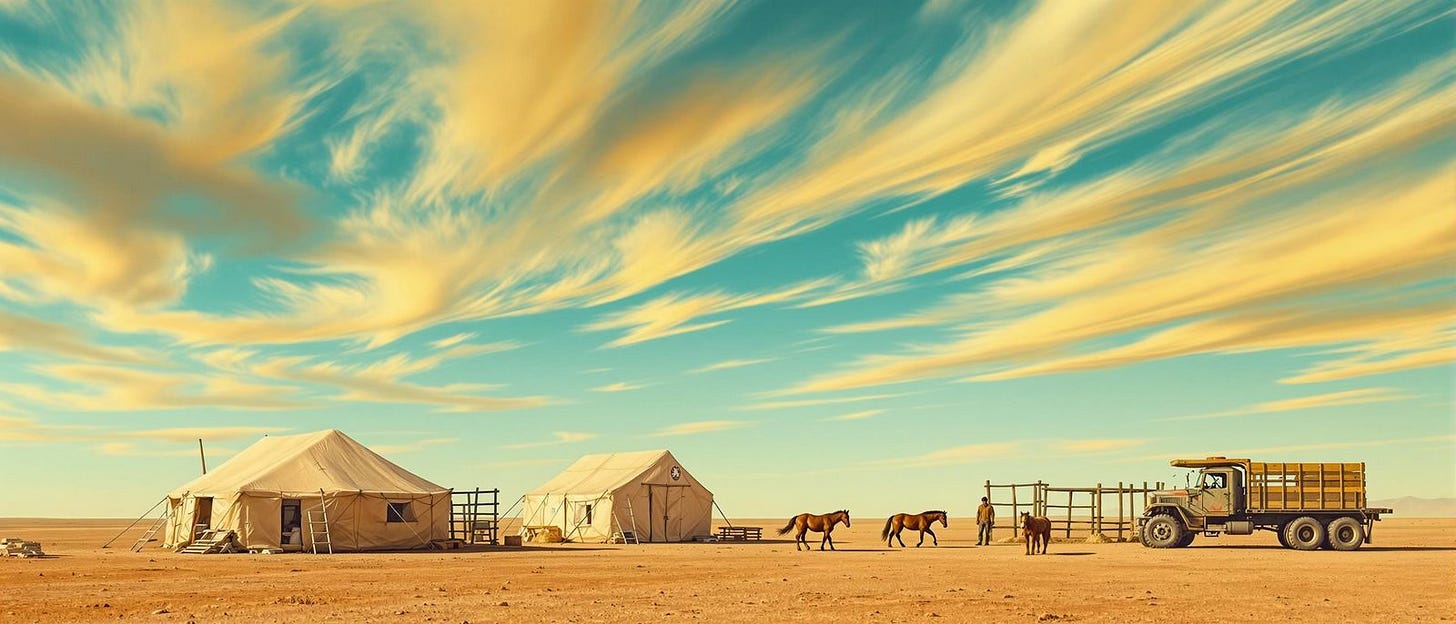Safiya is twenty-three, and she is on the plains on the other side of the twin mountains behind Landing. All of them are Academy students except the two proctors and the water engineer, and they are in a vast, flat place with no name. If they look west there’s the spaceport, and every day or two a rocket takes off for the Station, or a lander glides down to the long runway. If they look north or east, there’s nothing, just a blank desert. South is the hills north of Landing, the twin mountains, and then the hills rising to the Serpent Mountains in the southeast. Everything is clean and empty like Safiya likes it.
They have a camp, six tents to sleep in, a work tent, a lab tent, a mess tent, and the engineer’s tent, and a corral built of packing flats that were made of wood from twelve light years away and nailed together by someone a century dead. The horses clop back and forth, drinking from their trough and eating hay and oats. The truck sits near the lab tent. Safiya rides out every day with some of the students to collect samples and drill test holes in the regolith. A hundred meters deep. Two hundred. Deeper.
“There’s God knows how much water under here,” the engineer says. He’s a cheerful man with short, curly gray hair and skin as dark as the night sky. “All we have to do is find a good place to drill and pump it. This could be good farmland someday.”
He says the salts left in the dirt and rocks can be amended and organics added, and their camp could be a town in time because it had a good vista over the plain. They laugh and try to name the place; it has a new name every day. Camp Stink. Wind-place. Dusty-hole. They all use the new language. One of the girls has a little boy with her, three years old, and he only speaks the new language, playing with clicking rocks, not pale like her, not dark like his father, not Brazilian and not Namibian. Iphigenian. He wears a wide floppy hat to keep the sun off; it used to be the engineer’s. The little boy’s name is Agabo.
The other women and girls are interested in having babies, but not many. Safiya is not sure. She thinks about that on the back of her horse as they ride to the champignon forest. It isn’t much of a forest, just a flat upland with tall, widely-spaced, spindly demi-plant things that cast no shade, pale, rock-hard, with fruiting caps a couple of meters above your head. Champignon is an old word that meant mushroom—she remembers someone said it was French—and it stuck, even though the correct new word is fungarbo. No one calls them that.
She sits on horseback among the champignons—Ŝi sidas rajde inter la ĉampinjonoj—and wonders what it would be like to have a baby. Or two. All the pictures in the Lower-School and the Upper-School showed large families, three, four children, though she could hardly think of many families that did. In Academy they had Social Responsibility class, and the women were critical of the push to have large families. “Why do we have to do the work?” they said.
“I watched one come out of my sister. Oh, my God, she yelled.”
There hadn’t been a good answer to that. Safiya couldn’t figure one out, either. It seemed odd that you’d be in the twenty-fourth century arguing about women having big families like they were twentieth-century peasants or something. She was inclined to agree with some of the girls who said, “If we can clone animals, we can clone people. Do that!”
Still, she watched Isabel and Agabo and thought.
Feng was her partner on the samples. They took tiny deep cores out of the champignons and tried to measure their growth through the minute lines of silica deposited every year inside them. You had to use electron microscopy. They were old plants, half a meter thick. This tiny gray line just inside the skin would be the year Safiya was born in Landing. This gray line a couple millimeters in was when MacArthur landed at Leyte. A centimeter in, Magellan died at Mactan. Another centimeter in, Hinduism and Buddhism reached the Philippines. Another centimeter in, the Zhou dynasty was founded.
Feng told her about that one. He’s a good-looking young man, his eyes tilted up a bit like her own, but he’s much paler, black, black hair, a nice smile, strong. Wistful about Chinese history. He likes the idea of a big family. “If you don’t have kids, no people,” he says, and sighs.
They pull out the core sample and put it in the case. Dry cycles, wet cycles, dry cycles. Temperature cycles.
The sun is hot, and his coverall top is off, and the sweat makes his shirt stick to his muscles.
Safiya wonders what kind of father Feng would be.






I like it! This makes me want to read more.... which I assume is the intent! :)